- Home
- Joy Dettman
Trails in the Dust Page 2
Trails in the Dust Read online
Page 2
‘I didn’t know until Mum told me today that Trudy had gone back to her husband,’ Donna Palmer said. Jenny had two Palmers in her car, Jessica in the front passenger seat and her daughter, Donna, in the rear. She’d been married twice, but since leaving the last one Donna had gone back to using her maiden name. ‘I heard she had a new bloke in Willama,’ she said.
‘You didn’t hear that from me,’ Jessica said.
‘I didn’t say I did. I heard it from someone though.’
It was a fact, though Jenny didn’t admit it. At Christmas time Trudy had spoken to Georgie about a divorce and gaining sole custody of the twins. She’d spoken of a Graham too, a paramedic. Jenny hadn’t met him, but he’d phoned twice to speak to Trudy, and you can glean a lot of information from one-sided phone calls.
‘You must miss those boys like hell,’ Donna said.
Miss them? Jenny ached for them. She spent half of her nights planning to drive down to Croydon and kidnap them, and the other half planning to phone their mother and roar the tripe out of her. She was no brainless teenager controlled by hormones. She was an over-qualified nursing sister – with a ball-and-chain pretty boy dragging her down.
‘What happened to change her mind, like?’
‘How’s your tooth?’ Jenny asked. Donna’s aching tooth had kept her mouth shut on the trip down. Her jaw anesthetised, the problem tooth extracted, she’d been making up for time lost since getting into the car in the Woolworths car park.
‘Numb,’ Donna said. ‘Someone at the op-shop told me about Trudy’s bloke and I can’t remember who it was. Someone who’d know.’
If there was gossip to be heard and passed on, the op-shop was the ideal forum, and Donna spent most of her days there behind its counter.
Jenny glanced to her right, where a farmer and his tractor were readying a wide paddock for a crop. Scattered storms had been forecast. The sky was clear and there was a hot wind blowing from the west. It was partying on that newly turned soil, flinging clouds of dust at the road. Officially, summer ended in February. In this part of Victoria, no one paid a lot of heed to calendars. Summer ended when it ended – and had been known to continue into April.
Flat land, flat and dry and ugly, its only relief the grey of distant gums. The forest began at the Mission Bridge.
‘Kangaroos,’ Jessica warned.
There was a mob of them to the right, well off the road, but Jenny slowed her speed anyway. She and Jim had a serious run-in with a big red roo one night. It wrote off their Holden, or the insurance company called it a write-off. Poor old Itchy-foot – Archibald Gerald Foote – had been killed by a kangaroo, and on this stretch of road.
‘What happened to make her change her mind?’ Donna asked.
‘She doesn’t want to talk about Trudy,’ Jessica said. ‘Learn to take a hint, Donna.’
‘I’m interested, that’s all.’
The third passenger, Alice Dobson, who’d spent her day at the hospital with her dying mother, hadn’t said a word since they’d picked her up out the front of the old folks’ home.
‘Marilyn Willis,’ Donna said. ‘That’s who told me! She works down there as a domestic. She said that Trudy’s new bloke was a male nurse or something. She said she’d seen them having coffee together, that he’d reached across the table and taken her hand.’
The road curved into the long approach to Mission Bridge and Jenny touched the brake to get her speed down. That bridge had a sixty-kilometre speed sign. She usually obeyed speed signs.
‘I can remember the old ones talking about building this bridge back when we were kids,’ Jessica said. ‘I must have been thirty before they got around to doing it.’
Like everything else, the plans for that bridge had been put aside when the Great Depression hit, then shelved when war broke out. It had taken Bob Menzies to shake the dust off the blueprints and get it built.
‘It opened to traffic in ’52,’ Jenny said. She remembered that year well – because of the school bus. The new bridge and the sealing of an old road out to the Aboriginal mission had given Woody Creek kids access to higher education – and given Jenny access to a doctor. She’d ridden the school bus down to Willama with Donny on her lap and schoolkids staring at him. She’d gone to the bank too –
Shook her head, shaking the memory of that day away. She’d had her hair cut today, and every time she had it cut, it showed more grey. She’d looked at bottles of hair dye at the supermarket, thinking a colour might lift her mood. It would take a bucket full of dye to lift it. Those boys and Trudy had been her life – and Jim’s.
He’d begged Trudy not to go. He’d begged her to leave her boys with them for a few weeks, and to give herself time alone with Nick. He’d never been a begging man.
Jenny hadn’t begged. She had a bad tongue when she let it loose. She’d said too much, and most of what she’d said hadn’t been complimentary to Nick.
Just couldn’t believe it. It came out of the blue. They’d been eating dinner.
‘I’m taking two weeks of my holidays,’ Trudy said. ‘We’re going down to Croydon.’
‘You’re not taking the boys,’ Jenny said.
‘They’re my sons and Nick’s, Mum. Of course I’m taking them.’
They might have carried his genes, but he’d played no part in raising them. Jenny had raised them. She’d been at their birth. He hadn’t seen those boys until they were a month old, and he wouldn’t have seen them then if his parents hadn’t driven him up to Woody Creek expecting to take Trudy and her babies back with them. She’d been in no state to go anywhere. She’d been a depressed mess, determined to breastfeed two babies when she hadn’t had milk enough to feed one. They’d spent their first month of life exercising their lungs. Nick’s mother could screech louder, but her menfolk had decided to leave well enough alone.
Baby bottles and formula had silenced the boys, a six-year-old Commodore stopped Trudy’s howling. She’d owed a fortune on her credit card. Jim would have paid it, but the hospital had been advertising for nursing staff. Since they’d been three months old, those boys had been Jenny’s. She’d pushed them around town in their twin stroller, had strapped them into twin car seats, had loved and adored them – and lost them.
Jim missed them. He had a habit of crawling into a black hole when his world turned bad. For a week Jenny had considered joining him in that hole, but they’d run out of toilet paper. People can’t survive without toilet paper and Woody Creek had no supermarket since the last owners had gone bankrupt.
The Mission Bridge behind her, she kept her speed down until she was by the old Aboriginal mission. All bar its church was gone, a church with no windows. Someone had built a service station-cum-general store beside it. A few families still lived out here.
After the mission, the road moved away from the forest. It was straight and wide enough to encourage speed. Wandering minds encouraged speed, and Jenny’s mind was wandering when she heard the siren. It flinched her mind back to the present, flinched her foot off the accelerator.
‘Someone tell me it’s an ambulance,’ she said.
‘It looks like that new cop,’ Donna said.
Jenny braked, pulled off to a shoulder of the road and wound her window down. Hot air outside – and him, full of hot air.
He was the sandy-headed, pinch-faced coot of a man she’d seen around Woody Creek for a couple of months and never once had seen him smile. Woody Creek wasn’t the optimum posting for constables with city-born brides.
‘Sorry,’ Jenny said. She’d been speeding. No gain in denying it.
‘Licence,’ he said.
She found it amongst her many cards. The photograph on it wasn’t awful. Her date of birth emblazoned on it was. Granny used to say that if you didn’t count the numbers, the numbers didn’t count. Driving licences counted every year. She didn’t look at it often. He looked at it then looked at her before handing it back.
‘Her husband’s not well,’ Jessica said. ‘She had to leav
e him home by himself.’ Sob stories went down well in some quarters. This one didn’t. Pinch-face wrote her a ticket.
The figure he wrote widened Jenny’s eyes. Age hadn’t stolen their blue. They had a patch of today’s sky in them with a touch of angry ocean. She loathed fines, loathed money spent and nothing to show for it. Only once before had she been pulled over for speeding and that had been years ago, when the fine was a lot less.
The figure silenced Donna – or Alice Dobson silenced her by suggesting they split it four ways. She was a pensioner. All three of Jenny’s passengers were pensioners. Woody Creek was that sort of town. School leavers who wanted to work left town. Those who didn’t signed up for the dole. There was work to be had in Willama, if you owned a reliable car. Donna could have got work in an office – had she owned a car.
The dashboard clock showed five o’clock when Jenny offloaded her passengers and their shopping. It was five-ten when she turned into Hooper Street. She’d told Jim she’d be home by four-thirty.
Someone had been here. She’d closed the big gate when she’d left. It was open. She’s back, Jenny thought, her eyes scanning for Trudy’s navy-blue Commodore. It wasn’t in the driveway or on the lawn. Had she parked down the back, Lila would have been down there. She was waiting in the driveway for her lady.
They had a big old shed-cum-garage, too full of junk to park in, and even if there had been space, the effort required to open and close its sagging timber doors would have been reason enough not to park under cover. Jenny parked down the back, beside Jim’s ramp, easier for him to get in and out of the car; also easier when she’d had two little boys and their stroller to lift in and out. These last three years she’d worn a curving track between an overgrown liquid amber and a crepe myrtle, then across the east side lawn to the house.
No little boys to unload today but five supermarket bags, one containing three loaves of crusty bread, two she’d freeze. When she bought her new fridge–freezer she’d have room to freeze a dozen loaves. She couldn’t live without her crusty bread.
The car locked, her hands loaded with shopping bags, she walked up the ramp to the back veranda. Twelve months ago, a local handyman had built that ramp so Jim could get his electric buggy up and down. He needed two hip replacements but refused to go near a hospital. He had his reasons, which Trudy refused to understand.
‘You’re a stubborn old man,’ she’d said to him.
‘He’s been a damn good father to you,’ Jenny told her.
No key necessary. The security door was hanging open and the main door unlocked. She stepped into the kitchen. ‘In or out,’ she said to Lila. Lila chose out, and Jenny walked to the table to dump her load.
‘I’m home,’ she called. ‘Everything that could go wrong, went wrong today, then that pinch-faced cop gave me a ticket.’
No reply. He needed two hearing aids along with two new hips – and he’d reached the age of sleeping where he sat.
THAT THURSDAY
For three years Trudy’s life had been in a holding pattern, like a plane circling a fog-shrouded airfield, unable to land but with too little fuel left in her tank to fly to another airfield. For those three years, she’d lived with her parents, and Nick had nothing in common with them. She’d never expected him to stay in Woody Creek. She hadn’t expected to stay in Woody Creek. She would have been down here when the boys were three months old if his maternal grandmother hadn’t died. He’d flown over to Greece to represent his branch of the family – and he’d stayed there until the boys were eighteen months old, until his parents moved into their new house, built by old Nicholas for his retirement. He hadn’t lived to enjoy it. Jenny found his death notice in the Herald Sun, a column full of words praising the life of Nicholas Papadimopolous. He had one son, four daughters, a beloved wife and relatives by the score. His daughter-in-law received no mention but her boys’ names had been listed amongst his grandchildren.
You weren’t supposed to think ill of the dead. Three times Trudy had met her father-in-law and all three meetings had been unpleasant. Buying a black frock for his funeral would have been hypocrisy.
Then, two days after the funeral, Nick had turned up in Woody Creek, in his father’s Range Rover. He hadn’t come to the house. He’d booked into a cabin behind the hotel and phoned her. They needed to talk, he’d said.
She’d needed to speak to him. At Christmas time she’d asked Georgie to begin the business of divorce. For three years Nick had been living as a single man, and when she’d knocked on that cabin door, she’d been convinced that he wouldn’t argue about making their separation permanent. She’d had the words ready. ‘It’s for the best,’ she’d say. ‘I can never be a part of your family. I’ve made a new life for myself up here.’
She hadn’t said those words. He’d held her, kissed her. First love is hard to kill, and the older you are when it hits, the harder it dies. She’d been passionately, madly in love with him the first time they’d slept together, in Venice. Her visit to his motel cabin had ended in bed.
Couldn’t face her parents, so she hadn’t. She’d showered at the cabin then gone to work. Had missed out on the Range Rover drama, had missed meeting his oldest sister and her husband and son and his mate.
They’d knocked on Jenny’s door. She’d thought they’d come to take the twins and refused to unlock the security door. They’d wanted the Range Rover. His father had willed it to his first-born grandson. He’d left Nick nothing.
The phone calls began then. Nick had said that he was living with his mother, who wasn’t handling the loss of old Nicholas. He’d phoned Trudy at night, at her work, begging her to move down to Croydon.
Then she missed her period, and it couldn’t be. She didn’t want another baby. But he’d kept on phoning. He’d been working, he’d said, driving one of his brother-in-law’s taxis.
‘You won’t need to work, Trude. You’ll be able to stay home with the boys and Mum. I want to know my sons,’ he’d said. ‘I love you. I’m nothing without you.’ He’d had nothing when she’d married him, which hadn’t mattered, not then.
Couldn’t tell Jenny she was pregnant. Couldn’t get an abortion in Willama. She’d been stressed out of her brain when her father cancelled an appointment she’d made for him months before.
‘You’re a stubborn old man,’ she’d said. ‘You’ll both be in nursing homes twelve months from now.’
Her father would be. He couldn’t get from the kitchen table to the back door without his walking frame. He needed Jenny’s help to get in and out of the shower, and when Trudy offered to help, they’d shooed her away.
‘I’m a trained nurse, Dad.’
‘Your mother will help me,’ he’d said.
‘For how much longer!’
Five days later, sick with the baby, or sick about it, she’d packed up and moved down to Croydon.
‘It’s a trial, Nick,’ she’d said. For her it had been time out, and that’s all, time to think about her predicament, or time to find an abortion clinic.
The house was a mansion, furnished with the best that money could buy from Franko Cozzo. Everything in it was new, from the space-age washer–dryer to the bedroom furniture. Nick’s father, determined to qualify for a part-pension, had spent money like water, then blown more than fifty-odd thousand on the Range Rover. As a couple he and Tessa may have qualified. As a widow, Tessa’s assets disqualified her.
She wasn’t well. She swallowed packets of pills, swallowed them haphazardly unless supervised, and she didn’t like Trudy’s interference – and Nick didn’t like supervising.
‘You need to diet, Tessa. Diabetes and blood pressure can be controlled with exercise and diet,’ Trudy had advised – too often.
Diet was a dirty word. Exercise was for others. Tessa couldn’t climb the stairs to the upper floor – which the twins worked out on their first day in Croydon. They ran for the stairs now as soon as boogieman grandma started screeching at them in Greek.
Nick didn’t kn
ow about the baby. Every morning Trudy woke determined to find an abortion clinic. She’d known where to find one fifteen years ago. She’d driven a friend there and driven her home after it was done. Too long away from Melbourne, everything had changed, the roads, buildings, shopping centres, and her friends had found new friends. One girl she’d been at school with had grandchildren the same age as the twins – and most of the people she used to know now owned or were buying their own homes.
Trudy had owned a house in Kew for a few months. Should never have sold it. Should have put tenants into it, as her father had advised at the time. She could have been living in Kew now, instead of in Tessa’s Franko Cozzo display house.
The hospitals hadn’t changed. She’d worked at a few, had temped at more before going overseas. Maybe that’s what she ought to do, get some temp work and give herself time to make the right decision. She’d been thinking in circles since the day she’d slept with Nick.
And he had bills she’d known nothing about until last week. He’d taken her out for dinner and the restaurant refused his credit card. She’d paid. He’d always been hopeless with cards. If he’d had a ten-thousand-dollar limit, he’d worked on the theory that the bank owed him that ten thousand.
They’d argued on the way home, about money. They’d argued that night in bed until he’d come clean about what he owed. He’d taken out two personal loans and both had accrued interest, and the interest accruing on his bank card was astronomical. What was hers had always been his. The same would apply with his debts.
Shouldn’t have come down here. Should have gone through with the divorce.
The phone was ringing downstairs. Tessa took the call. Her only exercise was getting out of her chair to pick up her phone. It was her phone, her display house. Trudy had no more rights in it than the cleaner who came in once a week.

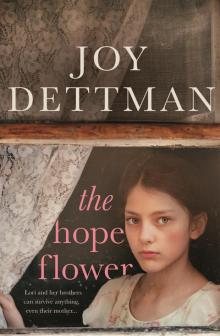 The Hope Flower
The Hope Flower Trails in the Dust
Trails in the Dust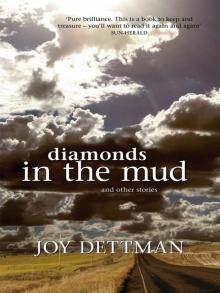 Diamonds in the Mud and Other Stories
Diamonds in the Mud and Other Stories Moth to the Flame
Moth to the Flame The Tying of Threads
The Tying of Threads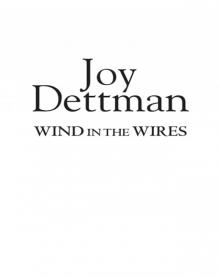 Wind in the Wires
Wind in the Wires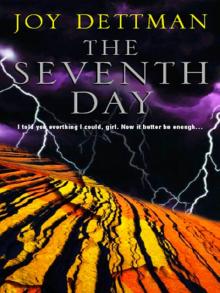 The Seventh Day
The Seventh Day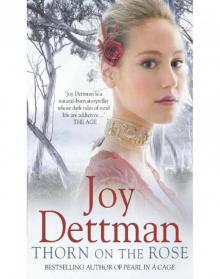 Thorn on the Rose
Thorn on the Rose Jacaranda Blue
Jacaranda Blue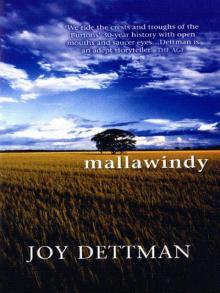 Mallawindy
Mallawindy Ripples on a Pond
Ripples on a Pond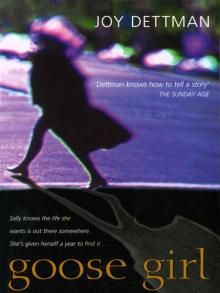 Goose Girl
Goose Girl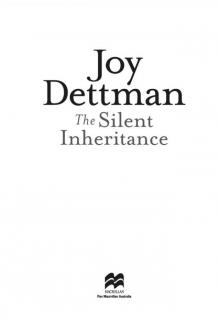 The Silent Inheritance
The Silent Inheritance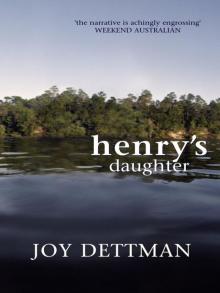 Henry’s Daughter
Henry’s Daughter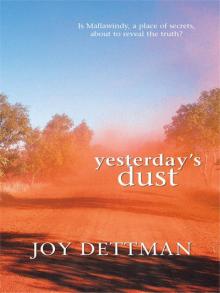 Yesterday's Dust
Yesterday's Dust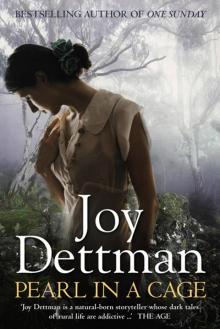 Pearl in a Cage
Pearl in a Cage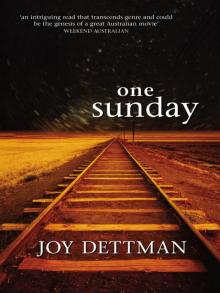 One Sunday
One Sunday